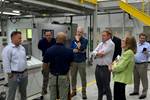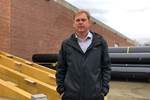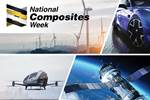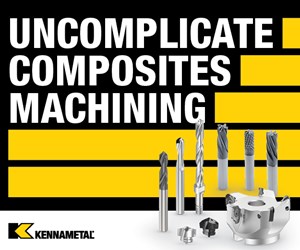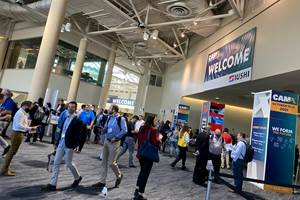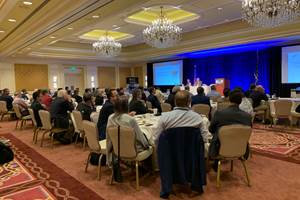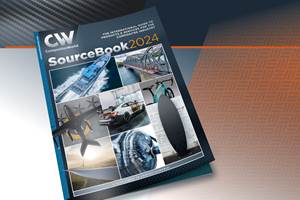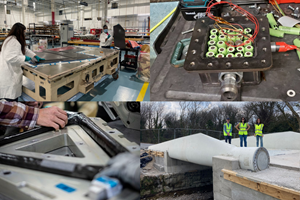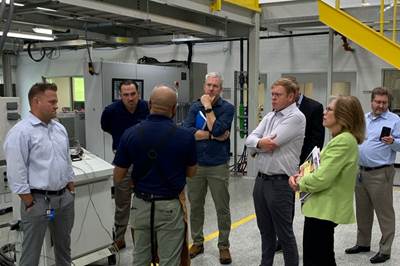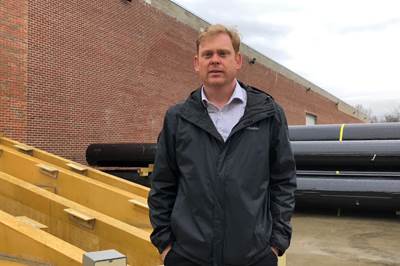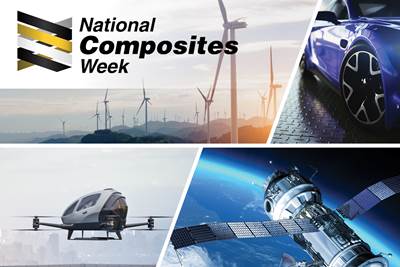Thoughts from the trade show floor
As the trade show season kicks off, CW editor-in-chief Scott Francis shares observations from industry events.
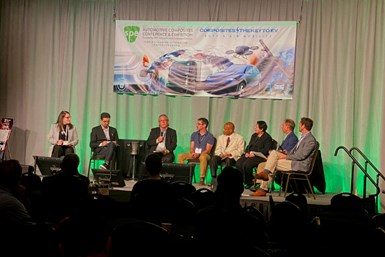
This year’s SPE ACCE featured a a panel discussion dedicated to end-of-life considerations for vehicles with regard to the evolving mix of materials being explored by automakers.
Photo Credit: CW
The fall event season is quickly ramping up. I recently attended the Society of Plastics Engineers (SPE) Automotive Composites Conference and Exhibition (ACCE), which is held annually in Novi, Mich., U.S. The event is one that I participated in regularly during my earlier stint with CW, and it was rewarding to revisit the event after a few years of missing it. For me, returning to the conference after some time away helped to emphasize just how much the automotive industry has changed during the past few years.
The COVID-19 pandemic sparked a multitude of challenges in all areas of manufacturing. The ripples from the event caused so many supply chain and workforce disruptions that writing those words feels cliché at this point. But, it was also a time that brought so many of the problems we have in society into stark focus. Weather events and wildfires brought more attention to the need for environmental and sustainable solutions. Disruptions in the normal routines of business allocated more time for R&D efforts.
During the past few years, the interest in electric vehicles (EVs), new energy vehicles and urban air mobility solutions has grown greatly. The SPE ACCE conference put me in the same room with many people associated with these sectors, including designers and engineers for Tier 1 automotive suppliers and OEM representatives. It was interesting to hear about some of the trends that are driving automaking decisions. Lightweighting, of course, is a big topic these days, driven by the rapid developments in EVs and hydrogen fuel cell-powered vehicles. Many signs point to aluminum as the frontrunner material of choice for automakers for structural components, but there are also numerous areas where carbon fiber and even natural fibers are used.
The flip side of material innovations is the need to consider the entire lifecycle of the resulting parts. With each requirement for recycled or naturally sourced options comes the question of how those materials will then be reclaimed or recycled at the component’s end of life (EOL). As part of the conference’s sustainability track, a panel discussion was dedicated to EOL considerations for vehicles with regard to the evolving mix of materials being explored by automakers.
Plenty of discussion at SPE ACCE revolved around sustainability — a term that currently encompasses everything from environmental considerations when sourcing materials to energy savings in processing to recycling. Vehicles that are at the end of their life now comprise a different mix of materials than those that will need to be recycled when the next generation of vehicles reaches its EOL, prompting the need for new innovations in recycling processes and technologies as we put a growing mix of vehicle types on the road — and aircraft in the skies.
The flip side of material innovations is the need to consider the entire lifecycle of the resulting parts.
Emerging mobility applications such as advanced air mobility (AAM) vehicles were another large topic of conversation. And while the automotive market may seem to be leaning toward aluminum, AAM will undoubtedly rely heavily on composites, an initiative we are already witnessing.
On the heels of SPE ACCE, I now find myself at FABTECH, North America’s largest event devoted to metal forming, welding and finishing,where I’m representing CW’s sister brand Products Finishing. Of course, many of the overarching manufacturing trends on the top of minds at that show — robotics, Industry 4.0 solutions, artificial intelligence (AI) and machine learning — are also shaping the future of the composites industry. The first day of FABTECH featured a panel that touched on a wide array of interrelated topics from solutions for data capture to the use of digital twins to the role of AI in manufacturing. These topics are working their way into every aspect of how things are made, no matter which materials are used.
As I walk these shows and talk to the people working in industry, I’m fascinated by how quickly things are changing. CW has been reporting on the composites industry for the past 30 years and it’s amazing to look back at all of the progress. To put some of this into context I urge you to check out this month’s 30-year retrospective article as well as a new episode of the CW Talks podcast featuring CW brand VP and former editor-in-chief Jeff Sloan.
When it comes to all of these markets, the path forward will continue to shift and new questions will be raised. One thing is for certain: The years ahead are sure to be exciting and I look forward to seeing what happens next.
Related Content
CAMX 2022: 10 reasons to attend
Looking for a good reason to attend CAMX 2022? Look no further.
Read MoreThe future of carbon fiber manufacture
Later this month, CW’s 25th anniversary Carbon Fiber Conference promises to be among the most important as dynamic market forces are putting unusual pressure on the carbon fiber supply chain.
Read MoreCompositesWorld SourceBook 2024
Welcome to CW’s annual SourceBook, your guide to suppliers of machinery, materials, software and other services for the composites industry.
Read MoreAs 2023 begins, a look back at trending CW topics in 2022
With 2022 now behind us, CW’s editor-in-chief Jeff Sloan takes a look at the CW stories last year that received the most reader attention.
Read MoreRead Next
Back in the composites saddle
The CompositesWorld team looks ahead to upcoming composites industry events and opportunities for the remainder of the year.
Read MoreThe (not exactly) new guy at CW
Former CW writer and editor Scott Francis rejoins the brand as editor-in-chief as Jeff Sloan assumes the role of publisher.
Read MoreCelebrating National Composites Week
August 21-25, 2023 is National Composites Week. This year’s theme is “Composites Are Now,” recognizing the ways composites are shaping the world today.
Read More

